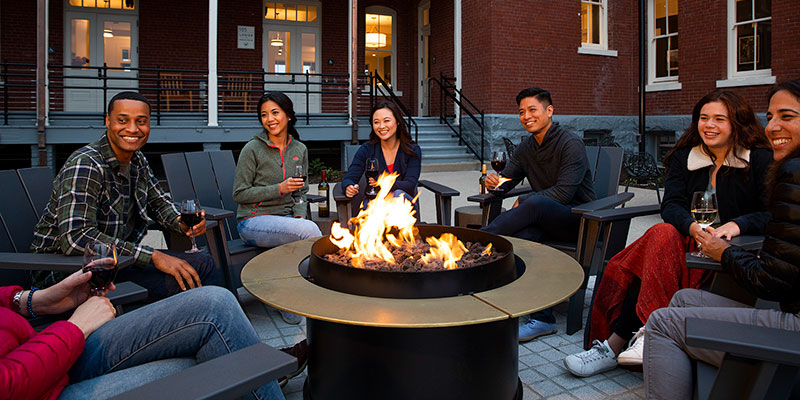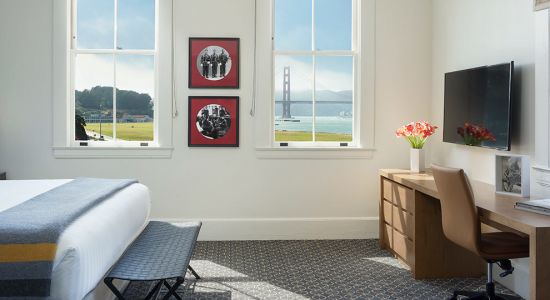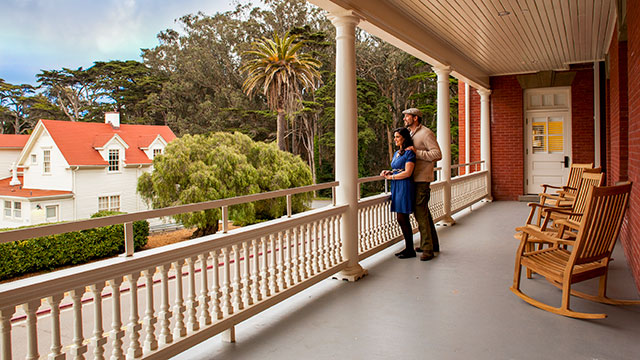
Terry Haney is Managing Director at Presidio Lodging, which runs the Lodge at the Presidio (San Francisco’s #1-rated hotel on TripAdvisor) and the Inn at the Presidio (a 5-time Conde Nast Reader’s Choice award winner). In this interview, we discuss attracting and retaining the right people, providing exceptional hospitality, and earning positive reviews.
You’ve achieved some incredible results at Presidio Lodging in a very competitive market. What are you most proud of?
I’m very proud of my employees. What we’ve achieved is not me. It’s them.
That’s been my philosophy all along. If my employees are happy, if they have the tools that they need and they’re happy in what they do and their only job is to make the guests happy, then they do.
If the guests are happy, then they write those positive reviews and we get the Reader’s Choice awards. Everything comes down to word of mouth when you’re running a small, independent hotel.

There are currently no open roles at your properties. How did you get to that place when everyone else seems to struggle with staffing?
We get a lot of word-of-mouth employees. I’ve always been successful at hiring people that my staff recommended. It’s been a key to our success.
My employees hear about an opening or they know if there’s a position that needs to be filled because all of a sudden they’ve got a cover more shifts. If somebody left, then we need to find a replacement. Our team often tells me “I know a guy. I’ve got a cousin, my sister’s brother’s kid.” That’s how we’ve got the majority of our back-of-the-house staff.
If I love this hotel and I like you as my boss, and I recommend someone for you to bring on, I’m going to make sure they perform and don’t make me look bad by being lazy or not doing their job.
Why do you work in hospitality?
I had no intention of it! You know when you’re 18 and they say, “What do you want to do for the rest of your life? Go to college and get a degree.” I had no idea what to get a degree in.
I wanted to go into horticulture and open a nursery at first. I thought the only people I would see are the ones who want to buy my plants. But I didn’t get through that.
So I got a job as a waiter and found that I’m a people pleaser. I like to serve. I like to make people happy.
I think that’s just innate in some people’s personalities. Like actors on stage that want the applause. They enjoy knowing they made somebody happy. That’s hospitality.
If you don’t enjoy people, if you don’t enjoy creating an experience for people and seeing their joy, you probably don’t belong in the hospitality industry. You’ll never be happy in it.
I don’t really want you working at my hotel if you don’t enjoy being with my guests. That’s the characteristic that I look for when I’m hiring. Are you a people person?
I can train you on anything: How to run the washing machine or how to make a bed or how to find reservations and check people in or answer the phone. All of those skills are trainable. I can’t train you to care. But if you are a person who’s naturally caring, I’ll hire you.
How do you identify which people will provide exceptional hospitality in the hiring process?
It’s easier than you think. I’ve been around long enough that I can read people.
There are probing questions that provide a feel for how people would handle a situation. “Give me an example of a time when you_____.” It’s not just, “what would you do in this situation?” because of course you’re going to tell me the ideal situation. Rather, “tell me about a time in your life when you’ve been in this situation and you’ve had to do this. What did you do?”
That’s very different because if I know what I’m supposed to do, but I’ve never actually done it, that’s different than telling you what I learned in school I should tell people.
I’m looking for people that don’t just call their manager if a guest is unhappy. I need people who want to solve problems for our guests. “How can I make you feel better? Whatever is going on with you right now, what can I do to improve that?”
How would you describe the feeling when you turn a tough situation around and make someone’s day?
It’s hard to describe but it’s the face-to-face experience. It’s the conversation with a guest in the lobby who tells me they’ve had the best time of their lives.
Maybe they’re here because they’re at UCSF Hospital and their family member just had brain surgery and we were able to be a respite for them to get out of the stress. Or veterans who were stationed here in the Presidio or they grew up in an army base and their stay brought back tremendous memories for them.
What is exceptional hospitality to you? What are the things that go into providing that?
It’s different for different guests. Exceptional hospitality isn’t necessarily what we have for everyone. Take a typical Four Seasons guest. Our hospitality may not be exceptional to them. Ritz Carlton guests may be looking for a totally different experience than what we’re offering.
We’re never trying to be something that we’re not. We offer a different experience than anyone else. If this isn’t what you’re looking for, then you’re not going to be happy here.
The person who’s wanting to go to San Francisco and looking for the best deal is not going to be happy at our property. If I drop my prices by $200 and start advertising on Expedia, I’m going to get a totally different guest – one who is not going to be happy about being out here in the middle of nowhere. We’re in the Presidio, which is within the city limits, but it’s 15 minutes to downtown. In traffic, it’s worse.
If people want to be 15 minutes from downtown, but still go hiking in the park and have coyotes outside my window and be close to the Golden Gate Bridge, we provide that. If that’s what you want and you’re willing to pay for it, then you’re a different clientele.

We don’t yield rates. Our rates are established throughout the year and don’t fluctuate depending on the market. Nobody does that. Our guests appreciate this. They feel like the room is worth this and it doesn’t matter what day of the week it is or how busy it is. That’s what the room is worth.
I tell everyone not to drop their ADR when times get tough. You’ll never get it back. I’ve seen this so many times. We held on to our pricing through COVID and we didn’t drop rates. If you were downtown and paid $275 for a room and now you come back and it’s $485, you’re not going to be happy. That’s not a $485 room to you.
We also choose our guests by where we market. I don’t partner with Expedia and Hotels.com and all the discount OTAs because our customers don’t shop there. I partner with Mr. And Mrs. Smith and Tablet and Kiwi collection – higher-end travel partners. I do that because of the market they’re in.
Our guests aren’t looking for a cheap room in San Francisco. They want an experience. That’s what we offer them – a very real experience. It’s not ‘ladies and gentlemen serving ladies and gentlemen’ – what we provide is almost peer to peer. Our staff is very respectful, but they’re welcoming and down to earth and at home in their skin. They can talk to people about where they want to go and what they want to do and can relate because they know the area so well.
Can you give some examples of this?
At the forefront in my mind right now are a lot of UCSF medical people. Somebody’s having cancer treatment or their kids had an accident and they’re from out of town. There’s a sense of coming back here and being safe and secure and not worried about being out of town that guest is very different than the honeymooner that you can send out on a private charter on the bay and they can propose to the fiance on a sailing ship with just me and her and the captain.
We’ve had veterans come in and they want to do a memorial, or were stationed here and are trying to remember what house they were in, and we’re trying to help them figure out what street it was.
The experiences we provide are as unique as our guests. The reason it’s not cookie-cutter is that our guests aren’t the same.

What other differences are there between how you operate and larger properties are managed?
At a big hotel, when you have hundreds of check-ins a day, many of them are here for the same reason. They’re here for a convention at Moscone or something like that. We don’t have any of that. We have people who are here because there’s a reason why they’re in the Presidio. It’s not that they were here for a conference and chose the hotel off a list provided by the organizer.
I’ve managed other hotels where we maintained a VIP list and planned together what can we do to really wow them. We don’t do that here. We’re trying to provide a real experience where we get to know our guests.
We know our repeat guests and they love that, but a lot of that honestly comes because we have a small property and my staff remembered them. It’s not because the computer flagged you as a repeat guest. We do see that – the night auditor goes through that and does a check for that – but a lot of times our staff just knows the guests by name or they’ll look at a reservation and go, ‘he’s here all the time.’
Our staff gets to know why the guest may be staying with us frequently. Maybe it’s because their kid just had a baby and they’re coming back every six months because they want to watch the kid grow up. They want to babysit the kid. We get to know stuff like that.
I think the reason people stop and write reviews is because they are blown away. The experience is not what they expected.
We don’t try to impress people artificially. We just genuinely care about them. In today’s world, to have someone genuinely care about you goes a long way. People don’t get that often.
When you have a memorable guest experience, you create loyal guests. They keep coming back. They become evangelists for your brand. They tell everyone about it.
I think that a lot of chains try to achieve this, but it’s harder with a large corporation than it is for a small, independent hotel.
Independent hotels are run almost as if they were a family operation. Employees don’t feel like they’re a cog in a huge corporate chain.
We really care about our team members as people. They enjoy coming to work because they enjoy being here. They enjoy making our guests happy. They get a real sense of satisfaction in knowing that they’ve created an experience for their guests and the guests are happy with their performance.
The walls and the linens and the artwork in your hotel only go so far. It’s the employees that bring the soul to your experience.

I learned early in my career from Bill Marriott who said, “Your number one job as a manager is to take care of your employees. If you take care of your employees, they take care of the guests. The happy guests will keep coming back and will tell other guests, and your business will just naturally take care of itself.”









